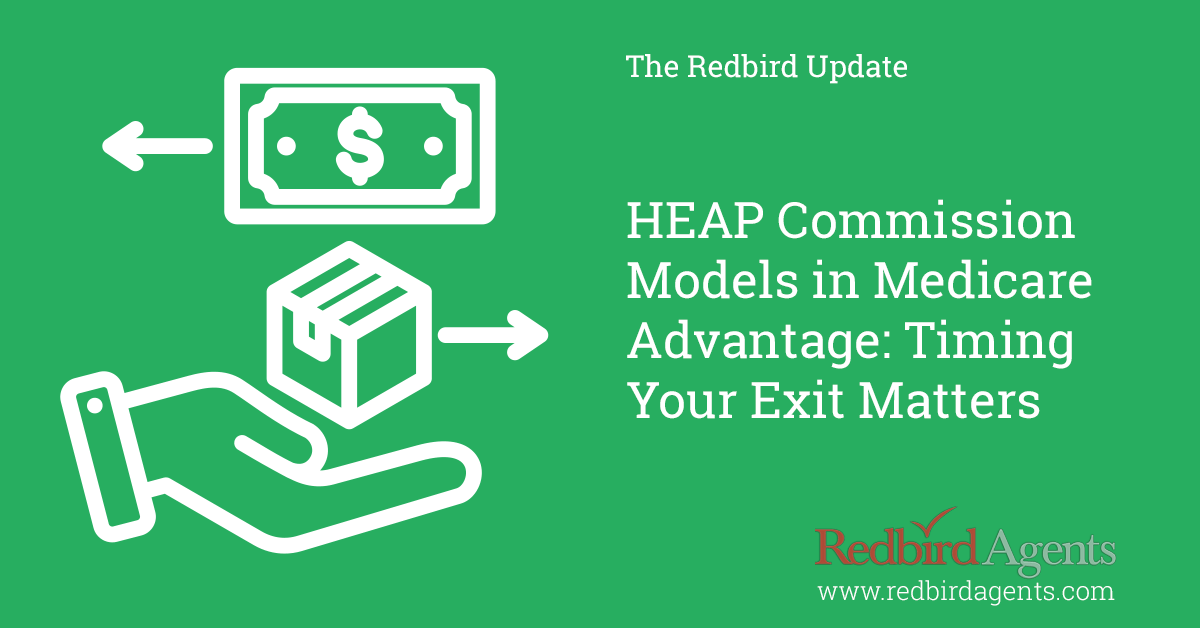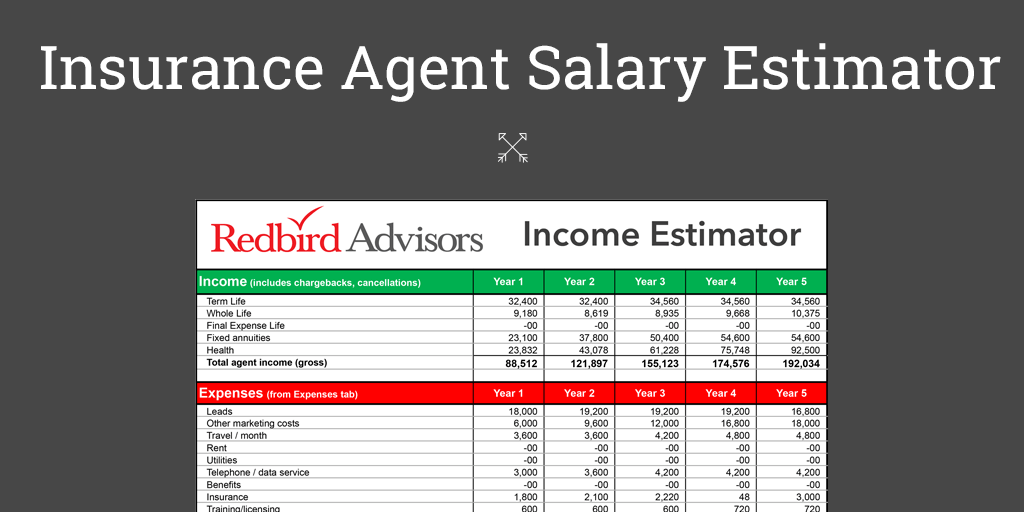
First, this article is not meant to bash the HEAP model. I’m here to discuss the model as well as some of the hard truths that have come with it. There are bad actors on both HEAP and traditional contracts, HEAP model seems to get more shade.
I know a number of agency owners who operate agencies on HEAP models, and they run fantastic businesses with strong retention and customer satisfaction.
Article At-A-Glance
- HEAP commission models are at the center of the complaint and retention discussions.
- Transitioning from HEAP commissions to traditional is likely going to be painful for 99% of agency owners in one way or another. They are either going to have to rip the band aid and wait a couple years for profitability, or they are going to have to raise money and potentially give away equity in exchange for their survival.
- We help agencies transition off HEAP and on to traditional contracts, and would like to be your growth partner.
“The Redbird Network was created to provide an unmet need to insurance agency owners looking for a true growth partner.” – Drew Gurley, Founder
- Learn how to transition off HEAP to traditional contracts.
- Learn the ins and outs of the traditional side of the business.
- Work with a dedicated, experienced, and proven growth team.
Understanding HEAP Commissions in Medicare Advantage
HEAP (heaped) commission structure is where agencies receive a one time, initial commission during enrollment but give up the renewal commissions and ownership of the policy. The initial commission is front loaded in many cases up to the LTV of the policy which allows for an agency to cash flow their growth easier.
This model has been widely used in health insurance, particularly during AEP (Annual Enrollment Period), when cash flow challenges are at their peak due to commissions paying after January 1st.
While HEAP payments can help agencies cover administrative fees, marketing costs, and agent compensation during heavy selling seasons, they also come with tradeoffs that can impact both Medicare beneficiaries and the agency’s future value.
Why HEAP Models Are Under Scrutiny
As captain obvious would say, CMS and HHS have been placing a sharper focus on commission practices across Medicare Advantage plans and Part D plans in recent months and years, creating various levels of evolution in the insurance sales models.
A combination of factors has brought HEAP models under the microscope:
Rising CTMs and Regulatory Oversight
CTMs are the talk of the town, literally!
The CMS Complaints Tracking Module (CTM) has shown increases tied to what they are describing as aggressive sales tactics. When Medicare broker commissions are heavily front-loaded, some agencies unfortunately prioritize speed over suitability, creating risks for policy holders.
This trend has led to CMS changes in the final rule for contract year 2025, with more attention on broker compensation and fair market value standards. To the point that there is no differentiation between founded and unfounded CTMS. To say the pressure is on is an understatement.
Additionally, carriers are cracking down on CTM rates per thousand and applying additional pressure on agency accountability.
Could this be avoided? I guess so, but it’s going require people that live their lives being okay with predatory behavior to change, which is a long shot. The CTM actions have to occur and the high quality shops should have nothing to worry about.
Lower Customer Satisfaction
Enrollees in MA plans and PDPs (prescription drug plans) expect and require ongoing support. The common argument is “well what are we supposed to do when carriers begin suppressing plans and cutting commissions”?
My advice is change your financial modeling and allocate a percentage of revenue to customer service and retention like other businesses do. This is avoidable and in my opinion, greed is the only thing that gets in the way.
Agencies that rely on HEAP models shouldn’t lack the incentive or resources to provide quality service after initial enrollments, leaving customers underserved and more likely to switch insurance plans. They just need to take a step back and re evaluate their budget.
Attracting the Wrong Incentives
While not all agencies on HEAP contracts are bad actors, the structure has historically attracted short-term opportunists.
This undermines trust with providers, consumers, and insurance companies that want to see sustainable growth and strong compliance.
What I see happening, and it’s just my opinion, is that many of the sales agents in HEAP models are not going to be career insurance agents. They are fresh out of school or entering the workforce and found a decent paying sales job. If that job is terminated, I don’t see most of them staying in the business and trying to build a book of business.
HEAP vs. Traditional Contracts: Ownership Matters
Here’s the critical distinction:
- With a traditional commission structure, agencies retain renewal commissions on Medicare Advantage commissions, Medigap, and Medicare Part D business. These renewals create equity, valuation, and recurring revenue that the agency owns.
- With a HEAP model, agencies essentially rent cash flow. They give up future income streams, including Medicare broker commissions and administrative fees, in exchange for immediate liquidity. I absolutely see why this model is attractive, while at the same time questioning the long term sustainability.
I’m bullish that agencies deserve to own their book of business, not lease it. However, I know HEAP commissions can serve as a great stepping stone to self fund a traditional sales model.
A good block of Medicare Advantage plans, Medicare Supplements, and some prescription drug plans provides consistent revenue, better service for Medicare beneficiaries, and a stronger valuation if you choose to sell down the road.
Timing the Transition Away From HEAP
Again, this is my opinion, but the question isn’t whether agencies should move away from HEAP, it’s when.
Unfortunately, timing is often dictated by program volatility and disruption (my favorite corporate buzzword), regulatory changes in CMS’s final rule, or shifts in compensation rates set by carriers which we have seen on and off over the last few years.
Some agencies in New Jersey, Puerto Rico, and the U.S. Virgin Islands have already seen adjustments in agent commissions and plan year payments that forced their hand. We’re also seeing it in Florida and even in some cases agencies getting terminated all together.
The earlier you start reclaiming renewal commissions, the sooner you start building true ownership.
Your pain of transitioning off HEAP to traditional contracts is guaranteed, it’s just a matter of how much pain you are willing to tolerate and for how long.
How We Help Rescue Agencies on HEAP Contracts
We’ve spent years working with independent agents, Medicare agents, and agency owners navigating the shift from HEAP contracts to traditional compensation.
Our Process
If we have time on our side, this is our proactive approach.
- We don’t judge: Our job as business partners is to support each other. HEAP has been a great solution for many people over the years and we never treat the transition as anything other than a celebration of professional development.
- Cash Flow Analysis: We help map your dependency on HEAP vs. renewal commissions. How long will it take to stop the cashflow bleed?
- Transition Planning: Design a bridge strategy that keeps your agency alive while moving toward ownership. This is usually a 18-24 month process that we will you architect.
- Contract Optimization: Negotiate better commission structures across MA plans, Medicare Supplement, and PDP business where we can. This part has become harder as many bad actors in the business seem to think they can work on unrealistic margins.
- Education & Support: From webinars to one-on-one planning, we prepare you and your team for the operational realities of the transition. A great example of this would be expediting the contracting process by deploying a strike team to your location to aid your team with contract processing and systems onboarding.
- Connect you with an FMO: We have deep relationships with many Medicare FMOs and can help you find the right fit based on you and your team’s needs.
We also lean on tools like AHIP training, compliance resources, and strategic partnerships with insurance companies to ensure the transition doesn’t disrupt service to your Medicare beneficiaries.
“The Redbird Network was created to provide an unmet need to insurance agency owners looking for a true growth partner.” – Drew Gurley, Founder
- Learn how to transition off HEAP to traditional contracts.
- Learn the ins and outs of the traditional side of the business.
- Work with a dedicated, experienced, and proven growth team.
The Future of Medicare Distribution
Everything in healthcare seems to be evolving at a fast rate right now. As CMS and HHS continue to refine the rules on Medicare Advantage commissions, the message is clear that long-term stability and consumer protection come first, with no exception.
In my experience, the agencies that reclaim their book-of-business ownership and renewal commissions have a better chance of surviving.
HEAP commission models may provide relief during initial enrollments and heavy enrollment seasons, but I have yet to see them build lasting value at this point in my career, however, I could be wrong if someone has a great example to share.
We help agencies make HEAP transition at their pace, and on their terms with full confidentiality. The timing is always personal, but when you’re ready, we’ll be here to help you stop renting cash flow and start building ownership.


